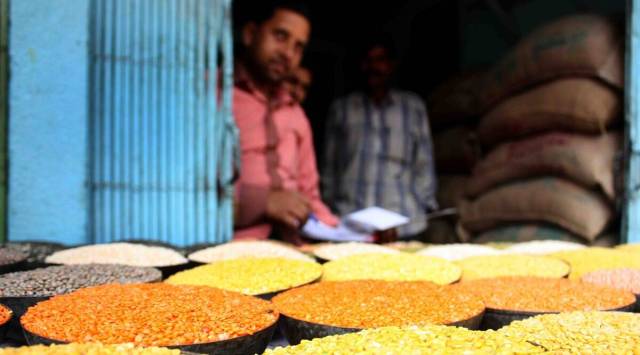IS THE worst of food inflation — 8.38 per cent year-on-year in April — over? Some hope is provided by milk, which has the highest weight among food items in the consumer price index after cereals. And also pulses, besides the likes of onion and potato.
International prices of dairy commodities have fallen off a cliff in the past month, and the effects are percolating to India as well.

The average price of skim milk powder (SMP) at the Global Dairy Trade fortnightly auction platform hit a high of $4,599 per tonne on April 5, almost twice its early-May 2020 low of $2,373. But that price has since eased to $4,130 per tonne in the latest May 3 auction.
The drop has been even more for anhydrous milk fat (ghee) prices, which have crashed from $7,111 to $6,008 per tonne between March 15 and May 3. These had again soared from the worldwide Covid lockdown-induced lows of $3,870 in July 2020.
“Prices had gone up to unsustainable levels. Milk fat prices were also partly rising along with vegetable fats, especially palm oil,” said R S Sodhi, managing director of the Gujarat Cooperative Milk Marketing Federation, better known as Amul.
The impact of demand destruction — buyers balking at record high prices — is being felt in India, too. Since mid-April, dairies have lowered prices of SMP and white butter produced from buffalo milk, from Rs 320/kg to Rs 300/kg and Rs 375/kg to Rs 365/kg, respectively. Ex-factory prices of cow milk SMP have also dropped from Rs 315/kg to Rs 295/kg in Karnataka and from Rs 295/kg to Rs 275/kg in Maharashtra; yellow cow butter from Rs 405/kg to Rs 395/kg in Karnataka and from Rs 400/kg to Rs 380/kg in Maharashtra.
According to Ganesan Palaniappan, a leading Chennai-based dairy commodities trader, there are two reasons for the fall in prices. First, domestic prices are tracking the global decline, over 15.5 per cent since mid-March for milk fat. Second, the early pre-monsoon showers in Karnataka and Tamil Nadu — normally from around the first week of May, it was 15 days early this time. “Cows start producing more milk with the rains, which aid fodder growth. Traders are destocking seeing the rains, anticipating a pick-up in milk arrivals,” he said.
Story continues below this ad
The lower SMP and fat realisations have already led Maharashtra dairies to reduce milk procurement prices. Dashrath S Mane, chairman of Indapur Dairy and Milk Products Ltd, confirmed that his plant in Pune district, which was procuring cow milk (containing 3.5% fat and 8.5% solids-not-fat) at Rs 35-36 per litre till May 5, has now cut it by Re 1/litre. He predicted further downward price corrections, “though it is unlikely to go below Rs 30-31”.
Sodhi felt that prices, including of SMP, butter and ghee, will stabilise and hover around current levels. “They will neither go up nor go down much,” he said. Palaniappan was of the view that prices will be supported by milk production in North India, which is primarily a buffalo belt, remaining low till at least July-end. Buffaloes begin calving only from August, with their milk flows peaking in the winter and staying high till March-April.
Newsletter | Click to get the day’s best explainers in your inbox
But the prices not rising — that too, in the “lean” summer season — is good news in itself. Amul and Mother Dairy raised retail prices of milk last by Rs 2/litre each in March 2022 and July 2021 — and before that in December 2019. Given current global dairy commodity market trends and the southwest monsoon hopefully arriving on time, further increases may not happen now.
Story continues below this ad
It’s not milk alone. The all-India modal (most-quoted) retail prices of most dals (split pulses) are actually lower now than a year ago: chana or chickpea (Rs 70/kg against Rs 75/kg), arhar/tur or pigeon-pea (Rs 100/kg against Rs 110/kg), urad or black gram (Rs 98/kg against Rs 107.5/kg) and moong or green gram (Rs 95/kg against Rs 105/kg). The same goes for onion (Rs 20/kg against Rs 25/kg) and potato (unchanged at Rs 20/kg), according to data from the department of consumer affairs.










